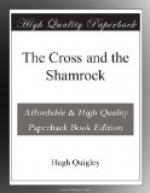“As clear as mud, madam,” resumed Devlin. “The Presbyterian religion is the ‘thorn’ tree on which no ‘grapes’ grow; for that sect reject the Holy Eucharist, containing the blood of Christ, of which the grape is a figure. It is full of thorns, for it persecutes and stings the head of the Savior in his representative the pope; and it produces no ‘grape,’ no sacrament, no good works, no refreshing food or drink. Again: the ‘thistle,’ that produces no figs, is the Methodist religion; because, though it has plenty of stings and prickles to wound the hand that touches it, the very ass that goes the road can bite off its head. Or, in other words, though ye Methodists are malicious enough, all your malice is harmless to the church, and a very fool can refute or crop the most formidable of your arguments.”
This queer private interpretation disconcerted the learned boss and his better half, and during the remainder of the service of the Devlins they did not hear much more about the religious interpretations of these professors of two contradictory sectarian creeds. The Devlins showed, not only to the boss and his wife, that they knew more about the Bible than themselves, but the minister, Mr. Waistcoat, was soon convinced, by conversation with them, that they were not to be duped. The consequence was, that the persecution to which Eugene was subjected was arrested for a time; and it was not till after the Devlins were paid off that this innocent child was again subjected to a series of punishments and brutal treatment without parallel in the records of modern persecution.
Every Friday that the young confessor refused, after the example of holy Eleazer, “to eat flesh, or go over to the life of the heathens,” (2 Mac. vi. 24.) he was compelled to go without food till the Sunday following. He was flogged with a “black snake,” till the blood flowed in rills, every time he refused going to meeting. He was compelled to stand out under rain and storm, scorching sun and chilling frost, during the time the family spent in prayer. Yes, tied with a thong to the pump by his little soft, white hands, the juvenile martyr had to bear the merciless violence of the elements, or consent to share in the blasphemous prayers of his persecutors! And, O God! worse than all, they robbed him of his rosary, and of the little bunch of shamrocks which were the only legacy of his dying mother to him, and which his sister Bridget and he took so much pains to keep alive in a small glass vase brought from Ireland. The “Agnus Dei” and “Gospel” which it is usual with Irish Catholic children to wear around the neck, were also forcibly stripped off his person and put into the stove.
All his much-prized memorials were now gone—his beads, or rosary, with the crucifix attached, to remind him of his Redeemer; his little vase of shamrocks, to remind him of Ireland and St. Patrick; and his “Gospel of St. John,” and “Agnus Dei,” to recall to his mind his dignity and obligations as a believer in the gospel of Jesus Christ, and his confidence in the Lamb of God who took away his sins. These constituted all the riches and treasure of Eugene, and of these he was plundered and stripped ere he was confined in the old deserted house that stood a few rods away from the dwelling house, and where soon all the persecutions he suffered were terminated.




